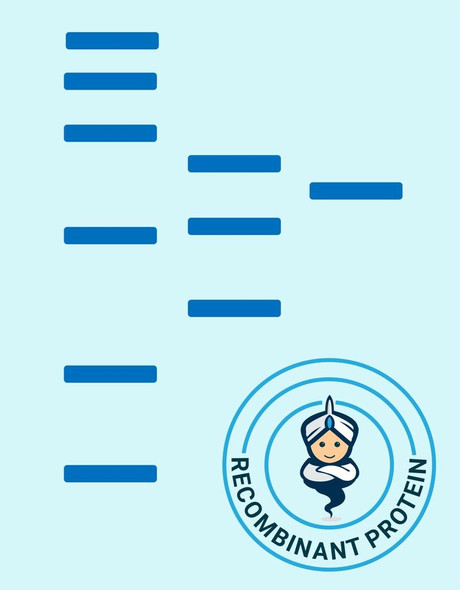Enzymes Recombinant Proteins
Human CTH Recombinant Protein (RPPB1510)
- SKU:
- RPPB1510
- Product Type:
- Recombinant Protein
- Species:
- Human
- Uniprot:
- P32929
- Research Area:
- Enzymes
Description
| Product Name: | Human CTH Recombinant Protein |
| Product Code: | RPPB1510 |
| Size: | 20µg |
| Species: | Human |
| Target: | CTH |
| Synonyms: | Cystathionine gamma-lyase, Cysteine-protein sulfhydrase, Gamma-cystathionase, CTH. |
| Source: | Escherichia Coli |
| Physical Appearance: | Sterile Filtered colorless solution. |
| Formulation: | The CTH solution (1mg/ml) contains 20mM Tris-HCl buffer (pH 8.0), 2mM DTT, 10% glycerol and 100mM NaCl. |
| Stability: | Store at 4°C if entire vial will be used within 2-4 weeks. Store, frozen at -20°C for longer periods of time. For long term storage it is recommended to add a carrier protein (0.1% HSA or BSA).Avoid multiple freeze-thaw cycles. |
| Purity: | Greater than 95.0% as determined by SDS-PAGE. |
| Amino Acid Sequence: | MGSSHHHHHH SSGLVPRGSH MQEKDASSQG FLPHFQHFAT QAIHVGQDPE QWTSRAVVPP ISLSTTFKQG APGQHSGFEY SRSGNPTRNC LEKAVAALDG AKYCLAFASG LAATVTITHL LKAGDQIICM DDVYGGTNRY FRQVASEFGL KISFVDCSKI KLLEAAITPE TKLVWIETPT NPTQKVIDIE GCAHIVHKHG DIILVVDNTF MSPYFQRPLA LGADISMYSA TKYMNGHSDV VMGLVSVNCE SLHNRLRFLQ NSLGAVPSPI DCYLCNRGLK TLHVRMEKHF KNGMAVAQFL ESNPWVEKVI YPGLPSHPQH ELVKRQCTGC TGMVTFYIKG TLQHAEIFLK NLKLFTLAES LGGFESLAEL PAIMTHASVL KNDRDVLGIS DTLIRLSVGL EDEEDLLEDL DQALKAAHPP SGSHS |
Cystathionine gamma-lyase or cystathionase (CTH) is a member of the trans-sulfuration enzymes family. CTH is an enzyme which breaks down cystathionine into cysteine and alpha-ketobutyrate. The CTH catalyzes the last step in the transsulfuration pathway from methionine to cysteine. Glutathione synthesis in the liver is dependent upon the availability of cysteine. Mutations in the CTH gene cause cystathioninuria.
CTH Human Recombinant produced in E.coli is a single, non-glycosylated polypeptide chain containing 425 amino acids (1-405) and having a molecular mass of 46.7kDa.CTH is fused to a 20 amino acid His-tag at N-terminus & purified by proprietary chromatographic techniques.
| UniProt Protein Function: | CTH: Catalyzes the last step in the trans-sulfuration pathway from methionine to cysteine. Has broad substrate specificity. Converts cystathionine to cysteine, ammonia and 2-oxobutanoate. Converts two cysteine molecules to lanthionine and hydrogen sulfide. Can also accept homocysteine as substrate. Specificity depends on the levels of the endogenous substrates. Generates the endogenous signaling molecule hydrogen sulfide (H2S), and so contributes to the regulation of blood pressure. Acts as a cysteine-protein sulfhydrase by mediating sulfhydration of target proteins: sulfhydration consists of converting -SH groups into -SSH on specific cysteine residues of target proteins such as GAPDH, PTPN1 and NF-kappa-B subunit RELA, thereby regulating their function. Defects in CTH are the cause of cystathioninuria (CSTNU). It is an autosomal recessive phenotype characterized by abnormal accumulation of plasma cystathionine, leading to increased urinary excretion. Belongs to the trans-sulfuration enzymes family. 2 isoforms of the human protein are produced by alternative splicing. |
| UniProt Protein Details: | Protein type:EC 4.4.1.1; Amino Acid Metabolism - cysteine and methionine; Lyase; Energy Metabolism - nitrogen; Cell cycle regulation; Amino Acid Metabolism - glycine, serine and threonine; Other Amino Acids Metabolism - selenoamino acid Chromosomal Location of Human Ortholog: 1p31.1 Cellular Component: nucleoplasm; cytoplasm; cytosol; nucleus Molecular Function:calmodulin binding; protein binding; cystathionine gamma-lyase activity; homocysteine desulfhydrase activity; carbon-sulfur lyase activity; pyridoxal phosphate binding Biological Process: cysteine metabolic process; positive regulation of I-kappaB kinase/NF-kappaB cascade; sulfur amino acid metabolic process; unfolded protein response; sulfur amino acid catabolic process; protein-pyridoxal-5-phosphate linkage via peptidyl-N6-pyridoxal phosphate-L-lysine; transsulfuration; cysteine biosynthetic process; activation of NF-kappaB transcription factor; protein homotetramerization Disease: Cystathioninuria |
| NCBI Summary: | This gene encodes a cytoplasmic enzyme in the trans-sulfuration pathway that converts cystathione derived from methionine into cysteine. Glutathione synthesis in the liver is dependent upon the availability of cysteine. Mutations in this gene cause cystathioninuria. Alternative splicing of this gene results in three transcript variants encoding different isoforms. [provided by RefSeq, Jun 2010] |
| UniProt Code: | P32929 |
| NCBI GenInfo Identifier: | 27735163 |
| NCBI Gene ID: | 1491 |
| NCBI Accession: | P32929.3 |
| UniProt Secondary Accession: | P32929,Q53FB3, Q53Y79, Q9H4W7, Q9H4W8, B4E1R2, E9PDV0 |
| UniProt Related Accession: | P32929 |
| Molecular Weight: | 41,260 Da |
| NCBI Full Name: | Cystathionine gamma-lyase |
| NCBI Synonym Full Names: | cystathionine gamma-lyase |
| NCBI Official Symbol: | CTH�� |
| NCBI Protein Information: | cystathionine gamma-lyase; gamma-cystathionase; homoserine deaminase; cysteine desulfhydrase; homoserine dehydratase; cysteine-protein sulfhydrase; cystathionase (cystathionine gamma-lyase) |
| UniProt Protein Name: | Cystathionine gamma-lyase |
| UniProt Synonym Protein Names: | Cysteine-protein sulfhydrase; Gamma-cystathionase |
| Protein Family: | Cystathionine gamma-lyase |
| UniProt Gene Name: | CTH�� |
| UniProt Entry Name: | CGL_HUMAN |






